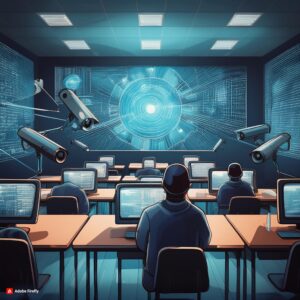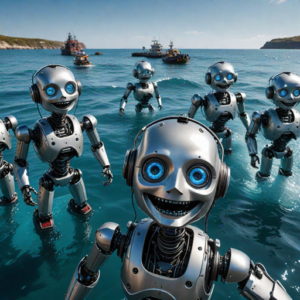I, for one, welcome our new AI overlords
I don’t know if I’ve ever experienced shockwaves sent through education the size AI has brought. By the time I was in school Google was already a thing. Calculators were not only allowed, but it was on the list of supplies needed before the year started. As far as I can remember everything in my elementary school, high school, and university experience was pretty status quo. This is the first major innovation affecting the classroom that I think I’ve been a part of. Though from what I’ve heard about the past it sounds like all of these things tend to follow the same trend.
At first, they’re hated by those in the world of education. They’re seen as harmful to learning and detrimental to the way curriculum is delivered. Second, they’re reluctantly accepted. The realization sets in that they’re not going anywhere. That despite the best efforts of those who despise innovation, new technology cannot be stopped. Third, educators start to understand them better. They come up with ideas and concepts for how to use these new technologies in the classroom. As such, certain ideals in education are shifted to better equate to the new world we’re living in. And finally they become normalized. Normalized to the point where we can hardly remember how things were before these innovations came to be. Both groups in the debate had great arguments, but I just can’t see AI going down a different path.
I will admit that AI does feel like it’s opening a much bigger can of worms than innovations of the past. Kelsey & Mariah opened my eyes to some concerns I hadn’t considered. The more information given to AI the better it can perform, but when the information is student data how much is too much? Daniel Buck’s article AI is a serious threat to student privacy is the first I heard about privacy concerns for students with the incorporation of AI. He doesn’t shy away from how useful it’s capable of being, but he raises some legitimate concerns over the storing and deletion of this data, as well as the effects of always having students under AI’s surveillance

Then you have the concern of AI’s bias problem. I was aware that AI images have a tendency to make any human in the photo white unless otherwise specified, or that it tends to add in racist or sexist stereotypes to images. Something during the debate I hadn’t heard of though was that AI detectors are more likely to falsely accuse non-native English speakers of using AI generated text. I believe this stemmed from Aniya Greene-Santos’s article Does AI Have a Bias Problem?. These failures of AI can’t just be swept to the side. If we’re going to accept AI into the classroom we first must realize that it’s not perfect. It has its issues and it most definitely has its biases.
If it’s able to learn from its areas of failure and improve then we can reap all of its successes. The benefit of AI that intrigues me the most is its personalized learning experiences and predictive analytics for student success. AI Uncovered’s 6 Ways AI Will Revolutionize Education by 2025 splits these into two separate benefits, but to me they’re almost intertwined. AI would be able to gather information on a learner, figure out their likes and dislikes in the classroom, and tailor the education experience to better fit their way of learning. This is essentially the starting point for the next benefit because it’s done in an attempt to increase student success. The AI can then track the progress the student is making in this new way of learning, and can pick up on early signs of them possibly not being engaged with the content. The pros of AI are truly incredible and will do amazing things for future generations of learners, but as mentioned before we have to be careful of it’s pitfalls.
Compared to the integration of things like calculators or computers I think AI has a much longer and challenging road ahead to reach that normalization that I discussed at the start of this post. In the privacy article Daniel Buck wrote “But these are not issues to face in some distant future of some science fiction novel. Many are here now”. That statement is a big wake up call. For some reason it’s still hard for me to grasp that the AI era is truly here. There was no build up, no slow burn. It was as if one day out of nowhere there was suddenly a vast sea of AI resources.

That quote makes me realizes that there is no waiting around to see how things play out. AI will continue to evolve and grow, so we either figure out how we’re going to utilize it in the classroom, or else we just roll over and wait to be replaced.
5 thoughts on “I, for one, welcome our new AI overlords”
Hello Josh,
Thanks for posting such a well written reflection! I think you did a fantastic job of summarizing both sides of the debate. I, like you, had my view broadened when the debaters started discussing privacy and security. I just keep thinking that with everything moving so fast and changing all the time, how long will it take for AI to become “normalized”? And when this does finally happen, will there already be something else up and coming?!
Your robot picture at the end of this post is only just slightly terrifying, but I am here for it!
Hi Joshua,
I like the chronology that you gave on how things evolve in education and how we all perceive various tools. People tend to diminish its value when something new comes and not see the positive side. Usually, it takes some time to reflect and see things with a positive mindset. AI is no exception to this. I consider AI a massive innovation in education, but that doesn’t mean we don’t have to be cautious. As with every technology tool, we must be careful how we utilize it and ensure it aligns with our educational goals and work ethics. We should embrace the benefits of AI and technology and simultaneously consider its limitations and implications.
Hi Joshua,
You are absolutely right about technology is going to evolve and we need to brace ourselves as well. In this high-tech world kids are born and get first hand opportunity to do anything with help of AI, assuming they know it all. If we want to keep up with that, we must need to cease the day. We need to comprehend
and develop the skills to utilize AI. Thanks for your amazing writing. Your insights are very informative. You never fail to amaze.
Your post on the integration of AI in education is both thought-provoking and balanced. I particularly appreciate your detailed exploration of the potential benefits and challenges, including privacy concerns and AI biases. The main takeaway for me is the critical need for educators to stay informed and adaptive as AI continues to evolve. As AI technology rapidly advances, what specific steps do you think educators and institutions should take to address and mitigate the ethical concerns associated with AI while maximizing its educational benefits?
Hi Josh
This post is quite thought-provoking and presents well-balanced arguments. Just as with any other technology introduced since the first industrial revolution, there are challenges to overcome before emerging technologies in the Fourth Industrial Revolution are widely accepted in education. So, it seems the status quo in education remains unchanged. There is always an initial resistance to change, but the education system later accepts the change when reality becomes apparent. One thing that is certain is that education have to adapt to change in order to prepare students with knowledge and skills relevant to the current job market. AI has come to stay and more sophisticated innovations are being released .